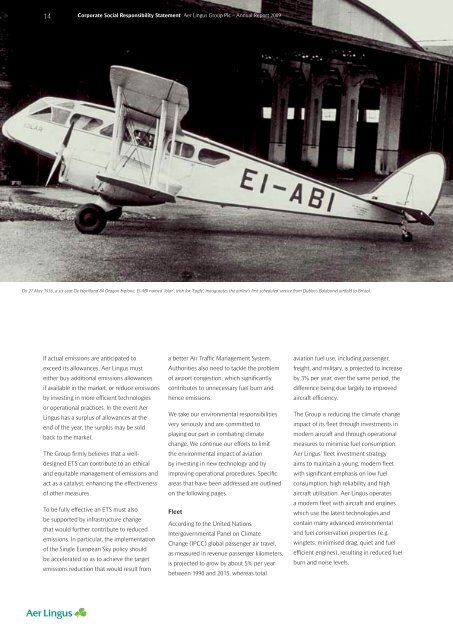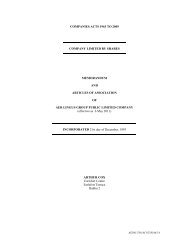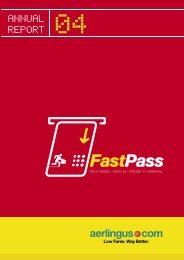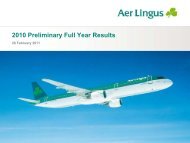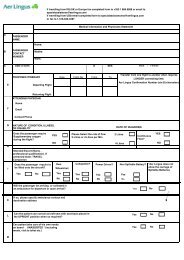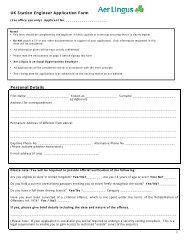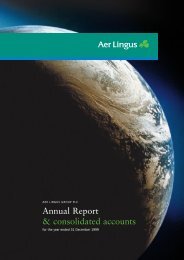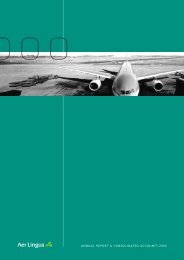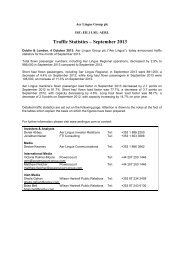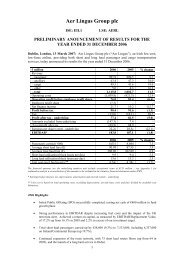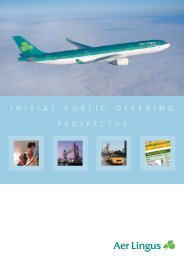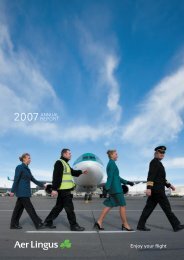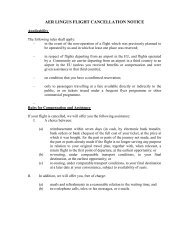annual report 2009 - Aer Lingus
annual report 2009 - Aer Lingus
annual report 2009 - Aer Lingus
Create successful ePaper yourself
Turn your PDF publications into a flip-book with our unique Google optimized e-Paper software.
14Corporate Social Responsibility Statement <strong>Aer</strong> <strong>Lingus</strong> Group Plc – Annual Report <strong>2009</strong>On 27 May 1936, a six-seat De Havilland 84 Dragon biplane, EI-ABI named ‘Iolar’, Irish for ‘Eagle’, inaugurates the airline’s first scheduled service from Dublin’s Baldonnel airfield to Bristol.If actual emissions are anticipated toexceed its allowances, <strong>Aer</strong> <strong>Lingus</strong> musteither buy additional emissions allowancesif available in the market, or reduce emissionsby investing in more efficient technologiesor operational practices. In the event <strong>Aer</strong><strong>Lingus</strong> has a surplus of allowances at theend of the year, the surplus may be soldback to the market.The Group firmly believes that a welldesignedETS can contribute to an ethicaland equitable management of emissions andact as a catalyst, enhancing the effectivenessof other measures.To be fully effective an ETS must alsobe supported by infrastructure changethat would further contribute to reducedemissions. In particular, the implementationof the Single European Sky policy shouldbe accelerated so as to achieve the targetemissions reduction that would result froma better Air Traffic Management System.Authorities also need to tackle the problemof airport congestion, which significantlycontributes to unnecessary fuel burn andhence emissions.We take our environmental responsibilitiesvery seriously and are committed toplaying our part in combating climatechange. We continue our efforts to limitthe environmental impact of aviationby investing in new technology and byimproving operational procedures. Specificareas that have been addressed are outlinedon the following pages.FleetAccording to the United NationsIntergovernmental Panel on ClimateChange (IPCC) global passenger air travel,as measured in revenue passenger kilometers,is projected to grow by about 5% per yearbetween 1990 and 2015, whereas totalaviation fuel use, including passenger,freight, and military, is projected to increaseby 3% per year, over the same period, thedifference being due largely to improvedaircraft efficiency.The Group is reducing the climate changeimpact of its fleet through investments inmodern aircraft and through operationalmeasures to minimise fuel consumption.<strong>Aer</strong> <strong>Lingus</strong>’ fleet investment strategyaims to maintain a young, modern fleetwith significant emphasis on low fuelconsumption, high reliability and highaircraft utilisation. <strong>Aer</strong> <strong>Lingus</strong> operatesa modern fleet with aircraft and engineswhich use the latest technologies andcontain many advanced environmentaland fuel conservation properties (e.g.winglets, minimised drag, quiet and fuelefficient engines), resulting in reduced fuelburn and noise levels.


